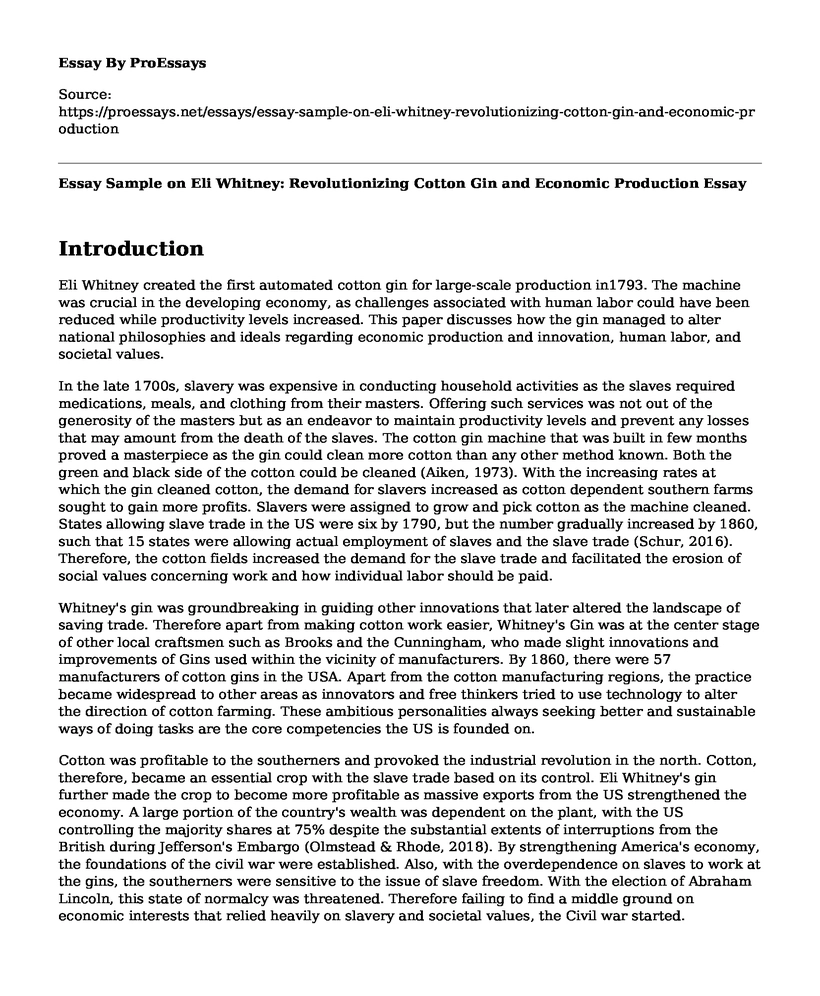Introduction
Eli Whitney created the first automated cotton gin for large-scale production in1793. The machine was crucial in the developing economy, as challenges associated with human labor could have been reduced while productivity levels increased. This paper discusses how the gin managed to alter national philosophies and ideals regarding economic production and innovation, human labor, and societal values.
In the late 1700s, slavery was expensive in conducting household activities as the slaves required medications, meals, and clothing from their masters. Offering such services was not out of the generosity of the masters but as an endeavor to maintain productivity levels and prevent any losses that may amount from the death of the slaves. The cotton gin machine that was built in few months proved a masterpiece as the gin could clean more cotton than any other method known. Both the green and black side of the cotton could be cleaned (Aiken, 1973). With the increasing rates at which the gin cleaned cotton, the demand for slavers increased as cotton dependent southern farms sought to gain more profits. Slavers were assigned to grow and pick cotton as the machine cleaned. States allowing slave trade in the US were six by 1790, but the number gradually increased by 1860, such that 15 states were allowing actual employment of slaves and the slave trade (Schur, 2016). Therefore, the cotton fields increased the demand for the slave trade and facilitated the erosion of social values concerning work and how individual labor should be paid.
Whitney's gin was groundbreaking in guiding other innovations that later altered the landscape of saving trade. Therefore apart from making cotton work easier, Whitney's Gin was at the center stage of other local craftsmen such as Brooks and the Cunningham, who made slight innovations and improvements of Gins used within the vicinity of manufacturers. By 1860, there were 57 manufacturers of cotton gins in the USA. Apart from the cotton manufacturing regions, the practice became widespread to other areas as innovators and free thinkers tried to use technology to alter the direction of cotton farming. These ambitious personalities always seeking better and sustainable ways of doing tasks are the core competencies the US is founded on.
Cotton was profitable to the southerners and provoked the industrial revolution in the north. Cotton, therefore, became an essential crop with the slave trade based on its control. Eli Whitney's gin further made the crop to become more profitable as massive exports from the US strengthened the economy. A large portion of the country's wealth was dependent on the plant, with the US controlling the majority shares at 75% despite the substantial extents of interruptions from the British during Jefferson's Embargo (Olmstead & Rhode, 2018). By strengthening America's economy, the foundations of the civil war were established. Also, with the overdependence on slaves to work at the gins, the southerners were sensitive to the issue of slave freedom. With the election of Abraham Lincoln, this state of normalcy was threatened. Therefore failing to find a middle ground on economic interests that relied heavily on slavery and societal values, the Civil war started.
Conclusion
Eli Whitney's gin did shape not only the economic aspect of the society but also the social and political interests of the US. Ideologies regarding innovations, human labor and copyrights were developed throughout the ginning evolution. Innovations became part of the society's ideals as individuals sought ways of perfecting the gin for efficiency in production. Slavery and its implications were also viewed from a different perspective as numerous groups disagreed on save use in cotton farms.
References
Aiken, C. S. (1973). The evolution of cotton ginning in the southeastern United States. Geographical Review, 196-224.
Olmstead, A. L., & Rhode, P. W. (2018). Cotton, slavery, and the new history of capitalism. Explorations in Economic History, 67, 1-17.
Schur, Joan Brodsky (2016). National Archives and Records Administration, Washington, DC.. 2001 20 pp. (ED461605) Eli Whitney's Patent for Cotton Gin
Cite this page
Essay Sample on Eli Whitney: Revolutionizing Cotton Gin and Economic Production. (2023, Mar 29). Retrieved from https://proessays.net/essays/essay-sample-on-eli-whitney-revolutionizing-cotton-gin-and-economic-production
If you are the original author of this essay and no longer wish to have it published on the ProEssays website, please click below to request its removal:
- Essay Sample on The Role of U.S Government on Economy in Employment
- Essay Sample on Underemployment Crisis: Exploring the Benefits of Self-Employment
- Paper Example on Waging a Living: Does Work Provide Enough for Working Americans?
- Job Satisfaction: Achieving Balance in a Multicultural Workplace - Essay Sample
- Barriers to Employment: How Racism Impacts Black Graduates' Job Search - Annotated Bibliography
- Financial Innovations: Benefits & Pitfalls of the Last Decade - Essay Sample
- Report Sample on Employment Laws in the COVID-19 Era







